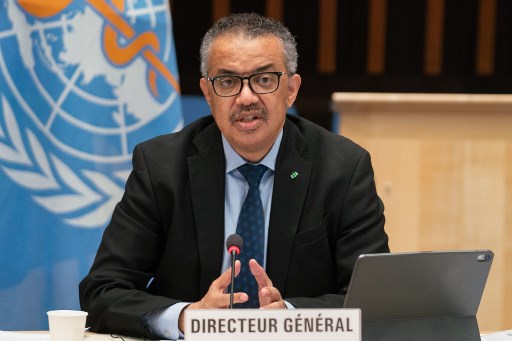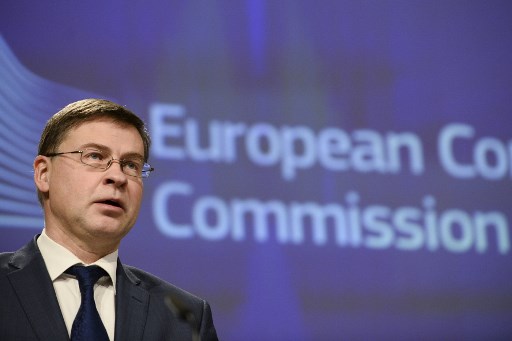WHO says countries must work together as COVAX readies vaccine rollout

(Eagle News) – The World Health Organization (WHO) Director General called on the world to seize the “window of opportunity” to defeat the pandemic through timely vaccine intervention, and thus prevent widespread transmission of the COVID-19 virus that had so far claimed more than 2 million lives.
WHO chief Dr Tedros Adhanom Ghebreyesus said that life-saving vaccines are a very limited resource right now, and warned against moves by some countries or grouping of countries that are attempting to block the equitable distribution of the life-saving COVID-19 vaccines worldwide.
He made this recent appeal twice: First on Jan. 29 as the European Union issued a new mechanism blocking exports of COVID-19 vaccines which were manufactured in the EU; Second on Feb. 3 as WHO’s COVAX Facility prepared its vaccine distribution worldwide.
The WHO chief called moves by some countries to limit vaccine deployment due to internal concerns as “vaccine nationalism”. This is very dangerous at this time, he said.
-Pandemic exposing inequalities-
“The pandemic has exposed and exploited the inequalities of our world. There is now the real danger that the very tools that could help to end the pandemic – vaccines – may exacerbate those same inequalities,” Dr. Tedros said in a speech on Jan. 29.
“Vaccine nationalism might serve short-term political goals. But it’s ultimately short-sighted and self-defeating. We will not end the pandemic anywhere until we end it everywhere,” he said.
EU on Jan. 29 passed a regulation that instructed its customs to block exports of COVID-19 vaccines to around 100 countries worldwide unless there is an export wuthorization from national governments in the EU.
WHO had criticized this move by the EU which the European Commission tried to defend as part of its commitment to its member-nations as they faced problems on vaccine deliveries with AstraZeneca.
-European Commission’s new regulation on vaccine export curbs-
European Commission Vice-President Valdis Dombrovskis defended the EU’s move as part of ensuring the protection of their citizens.

“Today the Commission has adopted an implementing Regulation making the export of certain products subject to an export authorisation. So this Regulation concerns the transparency and export of COVID-19 vaccines,” Dombrovskis said in his speech on Jan. 29.
“The protection and safety of our citizens is our priority. And the challenges we now face have left us with no other choice but to act,” he said. “Vaccines are key to the recovery and to bringing the pandemic under control. And delivering these to our citizens is the most critical task right now.”
This pronouncement from the European Commission is viewed with deep concern by WHO.
On Wednesday, Feb. 3, Dr. Tedros reiterated the urgency for countries to come together as more than 100 million total confirmed COVID-19 cases had been reported just a year after the deadly virus was first discovered in Wuhan, China.
“Last week, the world reached 100 million confirmed cases of COVID-19. In mid-January we surpassed 2 million deaths. These grim milestones underline the severity of this pandemic,” he said in his remarks at the “Forum of Small States.”
“While the development of vaccines is a great success, the world must not let the introduction of new vaccines deepen already existing inequalities and introduce new ones. We must work together, across borders and regions, to prioritize those most at risk, in all countries. Every country must do its part,” he said.
-Serious risk for equitable access-
The WHO chief noted that the world faced a “serious risk” regarding equitable access of the vaccines as supplies were rolled out
“But as things stand now, with every day that passes, the divide grows larger. Even as the first vaccines begin to be deployed around the world, the promise of equitable access is at serious risk,” he said on Wednesday.
Dr. Tedros said that the “the world has come to a critical turning point in the pandemic.”
“But it’s also a turning point in history: faced with a common crisis, can nations come together in a common approach?,” he said as a challenge.
-Danger of vaccine nationalism-
The WHO chief aptly described the danger of vaccine nationalism in his speech on Jan. 29.
“When a village is on fire, it makes no sense for a small group of people to hoard all the extinguishers to defend their own houses,” he said in his speech.
“The fire will be put out faster if everyone has an extinguisher and works together, in unison.”
Dr. Tedros also assured countries that there would be vaccines “enough for everyone” as “more vaccines are being developed, approved and produced.”
“There will be enough for everyone. But for now, vaccines are a limited resource. We must use them as effectively and as fairly as we can. If we do that, lives will be saved,” he stressed.
(Eagle News Service)







